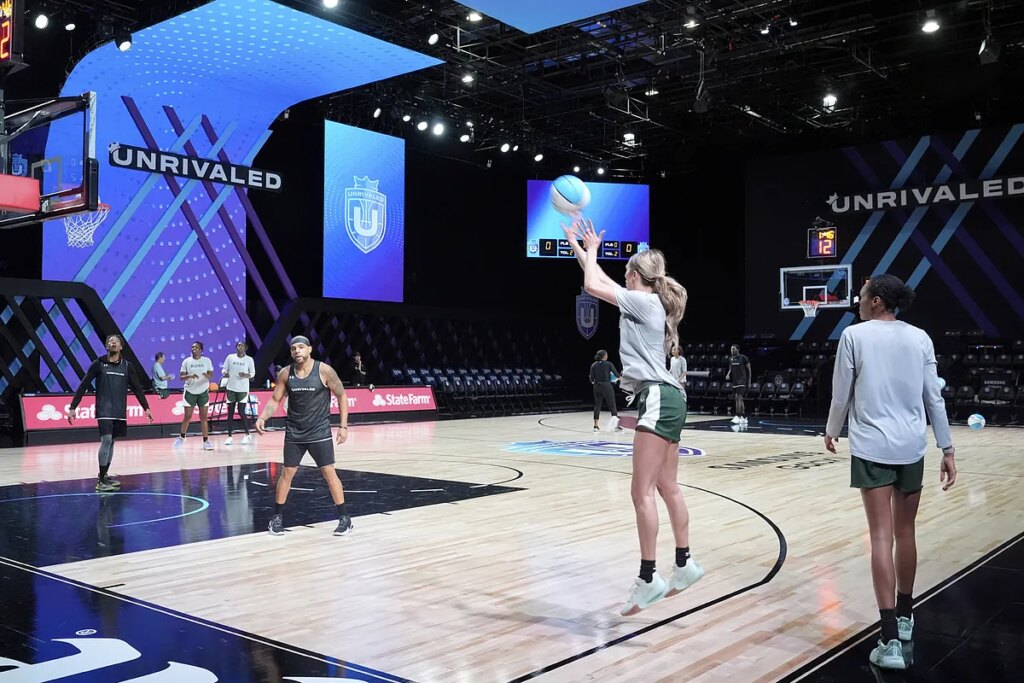The WNBA has long been the premier destination for professional women’s basketball in the United States, but a new league called Unrivaled has emerged as a formidable competitor.
With backing from high-profile athletes and investors, Unrivaled’s rapid $340 million rise threatens to reshape the landscape of women’s professional hoops, and poses a serious threat to the established elite.
Since its founding in 1997, the WNBA has battled financial limitations as early players earned an average of just $28,000, with top stars rarely exceeding $50,000 – and even now it remains an issue.
Many athletes still opt to compete overseas during the offseason to supplement their income, chasing the financial stability unavailable at home as they look to live comfortable lives.
And whilst the 2020 collective bargaining agreement marked a turning point, raising the salary cap by 30%, improving travel conditions, and providing greater financial security, that is now struggling to hold up to the 2025 picture.
Inflation eroded the value of these raises, and the league’s prioritization policy, which required players with three or more years of experience to report to training camp on time or risk suspension, limited their ability to play overseas.
For some players, the WNBA’s financial improvements still fell short, but that is something Unrivaled has the potential to change as Napheesa Collier and Breanna Stewart take a stand.
They launched the new league in 2025 as an alternative aimed at providing top-tier domestic competition without the constraints of the WNBA offseason, allowing competitors to stay within the United States.
It was built by basketball people for basketball players,” said Luke Cooper, president of basketball operations, and with $35 million in funding from investors including Giannis Antetokounmpo, Michael Phelps, Dawn Staley, and JuJu Watkins, the league set new standards for player compensation.
Unrivaled’s exceptional success
While the WNBA’s 2025 minimum salary was $66,079 for players with two or fewer years of experience and $78,831 for more experienced players, with maximums around $250,000, Unrivaled offered a total salary pool of $8 million.
So, it quickly attracted top talent as the average salary reached $222,222, with founding players also receiving equity in the league, drawing in even number-one draft picks such as Aliyah Boston, Rhyne Howard, Sabrina Ionescu, Jackie Young, Breanna Stewart, Jewell Loyd, and Brittney Griner.
Although Caitlin Clark opted not to compete, there were also 17 Olympians involved showing just how attractive the project is to modern women’s basketball players.
The league averaged 221,000 viewers across the regular season and playoffs on TNT and truTV, with the most-watched game being Napheesa Collier versus Aaliyah Edwards in the one-on-one final, which drew 377,000 viewers.
The championship game between Rose and Vinyl BC averaged 364,000 viewers, peaking at 385,000 and social media engagement also soared, with the league’s main accounts amassing nearly 400,000 followers.
The 36 players collectively gaining close to 1 million new followers since January 2025, whilst across TNT and truTV, Unrivaled reached more than 11.9 million viewers and delivered the 10 most-watched women’s basketball games in the networks’ history.
So, Unrivaled‘s swift rise, high salaries, and growing viewership signal that the WNBA may face its most significant domestic competition yet. Is there a new era of basketball on the horizon, and could it force the NBA itself to react?
Read the full article here

